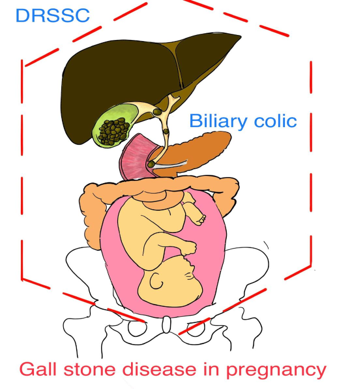
POSTPARTUM AND GALL STONE DISEASE
Posted on 2023-07-27 03:48:23 by SathishGall disease is common in middle aged females and so there is a relation between pregnancy and gall stone disease. This can be related to,
- Gall stone disease before pregnancy,
- Gall stone disease during pregnancy
- Gall stone disease after delivery (post-partum).
The complications rate of gall stone disease is about 3% per year. So young patients with gall stone can have complications at any point of their life including pregnancy also. So, if gall stones are diagnosed in young females waiting for pregnancy, it is better to treat before conception. If not treated these individuals may develop pain during pregnancy due to biliary colic. More importantly, these patients can present with obstructive jaundice or biliary pancreatitis due to bile duct stones. During pregnancy, in case of any complications related to gall stone disease, treatment also become difficult because of radiation involved for computerised tomography and ERCP procedures. So, elective laparoscopic cholecystectomy is indicated in females before pregnancy are,
- - Married or unmarried females with gall stones.
- - After marriage waiting for conception.
- - Individuals with gall stone disease waiting for fertility procedure like IVF (In-Vitro Fertilization)
- - Gall stone disease during pregnancy.
Most of the time the diagnosis of gall stone disease will be incidental and usually diagnosed during routine ultrasonographic examination of abdomen and uterus for pregnancy. If diagnosed after becoming pregnant then no intervention is required if there are no symptoms. The complication rate is about 3% per year. So, the development of complication during pregnancy may be low. But to avoid biliary colic during pregnancy better to take some precautions like avoiding fry, spicy, fatty and oil foods during pregnancy. But some patients develop pain during pregnancy due to gall stones. At this stage, if possible, can wait till the completion of pregnancy and can undergo elective laparoscopic cholecystectomy after delivery.
But if the pain persists, the patient can undergo elective laparoscopic cholecystectomy during second and third trimester of pregnancy with minimal risk to the foetus. There will be technical difficulty in doing laparoscopic cholecystectomy during third trimester of pregnancy due to large gravid uterus which occupies most of the abdominal cavity.
In case of severe pain during first trimester of pregnancy and if pain is very severe and not able to manage the only option will be to procced with laparoscopic cholecystectomy. The risk associated with the surgery will be miscarriage and congenital anomalies due to the drugs used during the surgery. So, if the patient undergoes any surgery during first trimester, follow up scans for congenital anomalies are very important.
GALL STONE DISEASE AFTER DELIVERY. (POST-PARTUM AND GALL STONE DISEASE)
Post-partum means about eight weeks period after delivery (Child birth) in females. After pregnancy and delivery of a baby either by normal delivery or by caesarean section, the mother will be encouraged to take more food to breast feed the baby. Usually, high nutrition food with more fat and proteins are added. So, in these females gall stone related problems are high if stones are pregnant before conception.
The gall stone can present as biliary colic, acute calculus cholecystitis, bile duct stone (Choledocholithiasis) with jaundice and biliary pancreatitis. So, any female after delivery with complaint of severe pain abdomen after food with vomiting is suggestive of post-partum biliary colic, acute calculus cholecystitis, sometime with bile duct stones or biliary pancreatitis.
The complications related to gall stone disease like bile duct stone with jaundice and biliary pancreatitis are more common during post-partum period. Therefore, if a woman who is trying to get pregnant, especially with assisted fertilization, comes to know that she has gallstone disease, she should get an elective laparoscopic cholecystectomy before getting pregnant. By doing this, the likelihood of difficulties after child birth caused by gall stones can be avoided.
